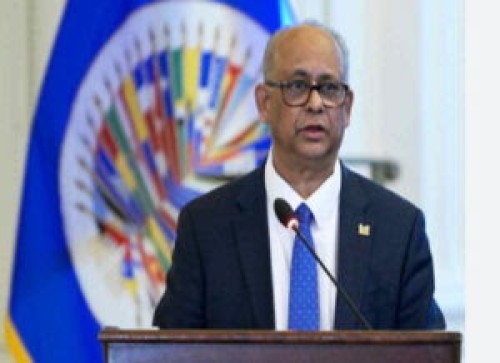WASHINGTON, DC – The Secretary General of the Organization of American States (OAS) , Albert Ramdin, is urging member states to “act with urgency” to finalize and implement a comprehensive plan aimed at restoring stability and driving development in Haiti.
 Addressing the Permanent Council earlier this week, Ramdin presented Version 3 of the “Roadmap for Stability and Peace in Haiti,” noting that the latest update now has “broad international support.” The first version of the plan was submitted in August.
Addressing the Permanent Council earlier this week, Ramdin presented Version 3 of the “Roadmap for Stability and Peace in Haiti,” noting that the latest update now has “broad international support.” The first version of the plan was submitted in August.
Ramdin warned that “time is running out,” stressing that the region must now move “from intention to concrete action” to ease the suffering of the Haitian people and lay the foundation for security, democracy and growth — led by Haitians with coordinated international backing.
“We must act urgently with concrete commitments to support the Haitian people and help restore stability, democracy and hope,” he said, adding that gangs continue to operate with “apparent freedom,” heightening the need to accelerate deployments and operational coordination.
The OAS Secretary General said active discussions are ongoing with Haitian political leadership, the United Nations, the Caribbean Community (CARICOM) and other partners to turn Haitian priorities into measurable actions.
He outlined three immediate areas of focus: security — including launching and monitoring the Gang Suppression Force (GSF); political dialogue and governance arrangements beyond February 2026; and election preparation and support.
Ramdin noted that humanitarian relief and electoral progress depend on real security gains and governance advances.
Version 3 of the Roadmap aligns with UN Security Council Resolution 2793, which establishes the GSF and the United Nations Support Office for Haiti (UNSOH), replacing the Multinational Security Mission.
The OAS will be responsible for logistics in support of the security response — including infrastructure, planning, operational oversight with the Haitian National Police, and management of sensitive information — complementing the SECURE-Haiti initiative.
He added that work is underway to bridge operational gaps during the transition period until UNSOH formally takes over in April. Ramdin has scheduled a virtual partners’ meeting for November 12 with the OAS, UN, CARICOM and Haitian leadership.
He has also invited member states to nominate candidates for GSF Special Representative and to contribute resources to the GSF and SECURE-Haiti program.
According to the OAS, the Haitian Roadmap is Haitian-led and internationally supported, coordinated through the OAS, CARICOM and the UN system. It is described as “dynamic and evolving,” linking emergency response to long-term reforms grounded in human rights, rule of law and accountability.
The plan is structured around five pillars: security and peace; political consensus and governance; electoral legitimacy; humanitarian response; and sustainable economic development. Implementation will include a “Haiti Roadmap Dashboard” to maintain transparency, monitoring and donor alignment, along with a new Coordination Group Mechanism involving the OAS, UN, CARICOM and Haitian authorities.
Ramdin said his visit to Haiti — postponed in late October due to Hurricane Melissa — is now being rescheduled for mid-December.


